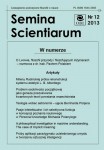Pasje intelektualne i ich selektywna funkcja w koncepcji poznania naukowego w Personal knowledge Michaela Polanyiego
DOI:
https://doi.org/10.15633/ss.577Słowa kluczowe:
Michael Polanyi, Personal knowledge, Towards a post-critical philosophy, personal knowledge, tacit knowledge, tacit knowing, intellectual passions, objectivity, selective intellectual passionsAbstrakt
This paper shows philosophical views of Michael Polanyi, in the context of his greatest work Personal knowledge: Towards a post-critical philosophy. In his study, Polanyi presents the original concept of science and knowledge, which include tacit components, such as: the personal, tacit knowledge, personal engagement, intellectual passions and participation in the scientists community, which shares the same tradition, language, frameworks and culture. All that makes the philosophy of Polanyi situated against the concept of objectivity in science which excludes personal participation in act of knowing and creating knowledge. As one of the most important factors in science formation Polanyi considers intellectual passions, which have heuristic, selective, persuasive functions. The present article is a summary of the main idea of the intellectual passions, in respect of their selective function in science. As Polanyi maintains, scientific passions have a logical function which contributes an indispensable element to science. They charge objects with emotions, making them repulsive or attractive and help distinguish between demonstratable facts which are of scientific interest, and those which are not. Furthermore, scientific passions depend ultimately on a sense of intellectual beauty, which can never be dispassionately defined, as well as the beauty of a work of art or the excellence of a noble action.
Bibliografia
E. Pietruska-Madej, Odkrycie naukowe. Kontrowersje filozoficzne, Warszawa 1990, s. 207–224.
M. Polanyi, Personal knowledge: Towards a post-critical philosophy, London 1962, preprint: Taylor & Francis e-Library, 2005.
W. Sady, Fleck o społecznej naturze poznania, Warszawa 2000.
B. Tuchańska, Koncepcja poznania i nauki Michaela Polanyi’ego, „Acta Universitatis Wratislaviensis”, Socjologia XV: Nauka, demokracja, autorytaryzm. Społeczne i kulturowe wymiary nauki, red. W. Sitek, Wrocław 1994, s. 105–127 oraz Personal knowledge. Towards a post-critical philosophy, [w:] Przewodnik po literaturze filozoficznej XX wieku, red. B. Skarga, Warszawa 1994, s. 400–405.
I. Zmyślony, Filozof nauki czy teoretyk poznania? Przyczynek do badań nad poglądami filozoficznymi Michaela Polanyiego, „Filozofia Nauki”, R. XVI, 2008.
J. Życiński, Elementy filozofii nauki, Tarnów 1996.
Pobrania
Opublikowane
Numer
Dział
Licencja
Prawa autorskie (c) 2013 Olga Szkonter

Praca jest udostępniana na licencji Creative Commons Attribution-NonCommercial-NoDerivatives 3.0 Unported License.
Twórca oświadcza, że przysługują mu prawa autorskie do utworu i że nie są ograniczone w zakresie objętym niniejszym oświadczeniem oraz że utwór jest dziełem oryginalnym i nie narusza praw autorskich innych osób.
Twórca zezwala Uniwersytetowi Papieskiemu Jana Pawła II w Krakowie na nieodpłatne, niewyłączne i nieograniczone w czasie korzystanie z utworu, to jest:
- utrwalanie i zwielokrotnianie: wytwarzanie egzemplarzy utworu techniką drukarską, reprograficzną, zapisu magnetycznego oraz techniką cyfrową;
- obrotu oryginałem albo egzemplarzami, na których utwór utrwalono (wprowadzanie do obrotu, użyczenie lub najem oryginału albo egzemplarzy, publiczne wystawienie, wyświetlenie, a także publiczne udostępnianie utworu w taki sposób, aby każdy mógł mieć do niego dostęp w miejscu i w czasie przez siebie wybranym);
- włączenie utworu w skład utworu zbiorowego;
- udzielanie przez Uniwersytet Papieski Jana Pawła II w Krakowie sublicencji Creative Commons Uznanie autorstwa-Użycie niekomercyjne-Bez utworów zależnych 3.0 Polska
Uniwersytet Papieski Jana Pawła II w Krakowie udostępnia utwór na Platformie Czasopism należącej do uczelni, na licencji Creative Commons Uznanie autorstwa-Użycie niekomercyjne-Bez utworów zależnych 3.0 Polska. Tym samym uprawnia wszystkich zainteresowanych do korzystania z utworu pod następującymi warunkami:
- zostanie podany autor i tytuł utworu,
- zostanie podane miejsce publikacji (tytuł czasopisma i adres internetowy do oryginalnie opublikowanego utworu),
- utwór będzie dystrybuowany w sposób niekomercyjny,
- nie będą tworzone utwory zależne.

